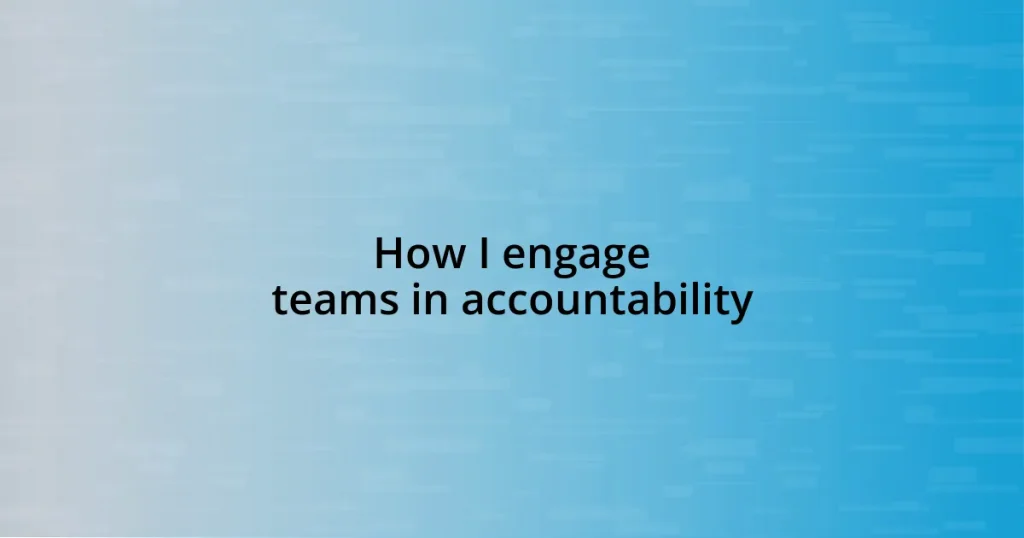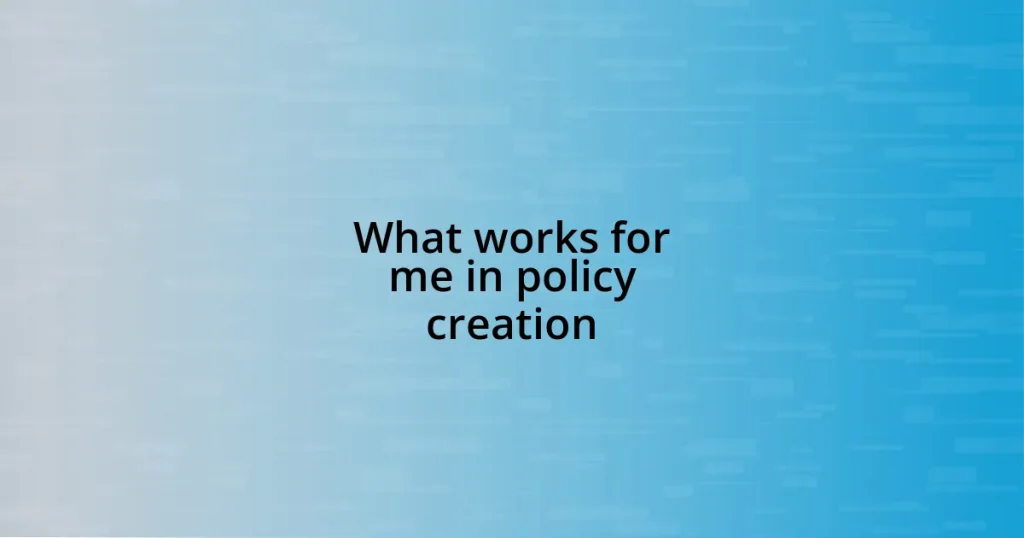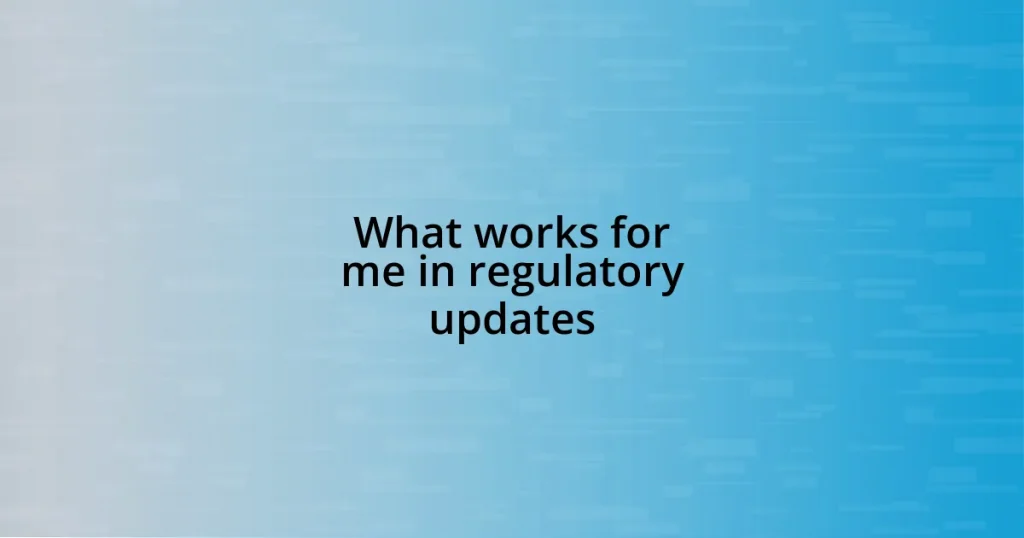Key takeaways:
- Team accountability fosters a culture of shared responsibility, enhancing collaboration, trust, and performance.
- Setting clear expectations and measurable goals significantly improves team productivity and morale.
- Open communication and regular check-ins encourage innovation, constructive feedback, and a culture of continuous improvement.
- Celebrating milestones and successes reinforces commitment and camaraderie within the team.
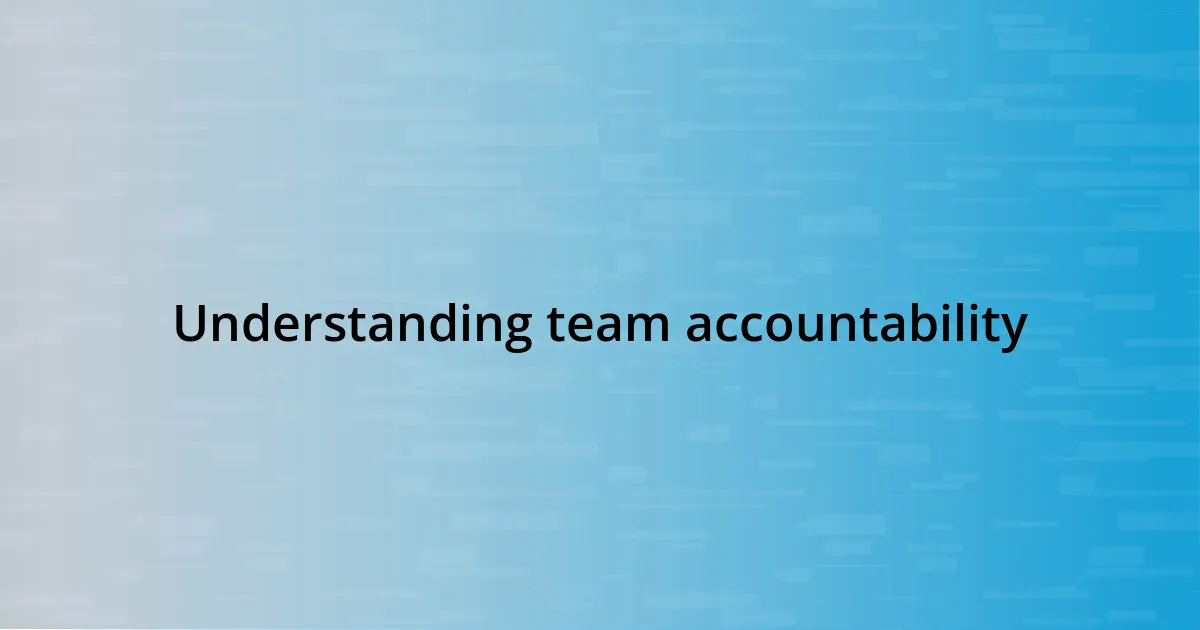
Understanding team accountability
When I think about team accountability, I picture a well-oiled machine where each part relies on the others to function optimally. It’s more than just meeting deadlines; it’s about fostering a culture where team members feel responsible not only for their tasks but also for each other’s success. Have you ever felt that rush of accomplishment when a team collectively rises to a challenge? That’s the heart of accountability.
In my experience, accountability in a team setting requires open communication and trust. When I’ve had the chance to create an atmosphere where everyone feels safe to voice their thoughts, I’ve noticed a remarkable shift. It’s like watching a flower bloom; encouragement goes a long way in transforming pressure into productive energy. How do you create that trust within your own teams? I believe it’s about leading by example and showing vulnerability.
Ultimately, understanding team accountability isn’t merely an exercise in checking off tasks; it’s about establishing shared ownership of goals. Think back to a time when you worked closely with a team and everyone took pride in their roles. That sense of camaraderie not only enhances performance but deepens relationships. Isn’t it incredible how accountability can transform a group of individuals into a cohesive unit with a common purpose?
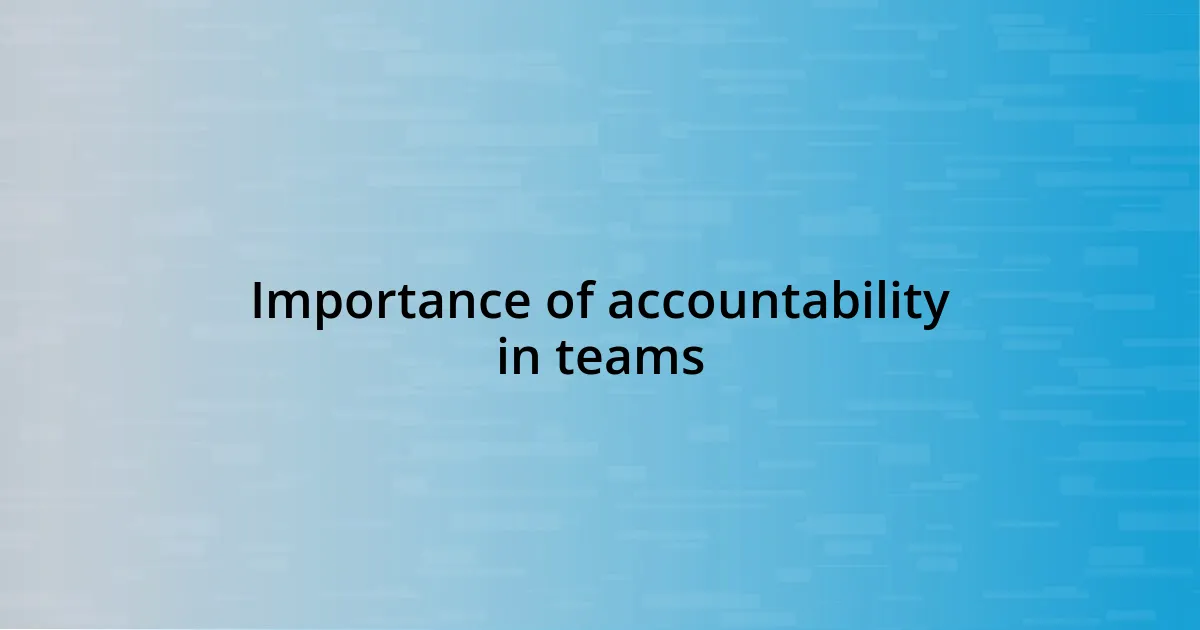
Importance of accountability in teams
Accountability in teams is the glue that holds everything together. I remember a project where we faced a tight deadline, and it was inspiring to see each person stepping up, taking ownership. When everyone knows their role and is accountable, it creates an environment charged with energy and purpose. Each success builds momentum, reinforcing the trust and reliability within the group.
- Establishes trust: Team members rely on each other, feeling confident that everyone will deliver.
- Promotes transparency: When accountability is prioritized, everyone is open about their progress, which reduces misunderstandings.
- Enhances performance: A strong sense of responsibility can boost motivation, leading to higher quality outcomes.
- Fosters camaraderie: Sharing successes and challenges collectively strengthens bonds among team members.
- Drives engagement: When individuals feel accountable, they are more invested in their work and in helping others succeed.
Reflecting on these benefits, I’ve found that accountability acts as a catalyst for deeper collaboration and more fulfilling work experiences. Each team member’s commitment transforms a routine task into a shared journey, making even tough challenges feel surmountable.
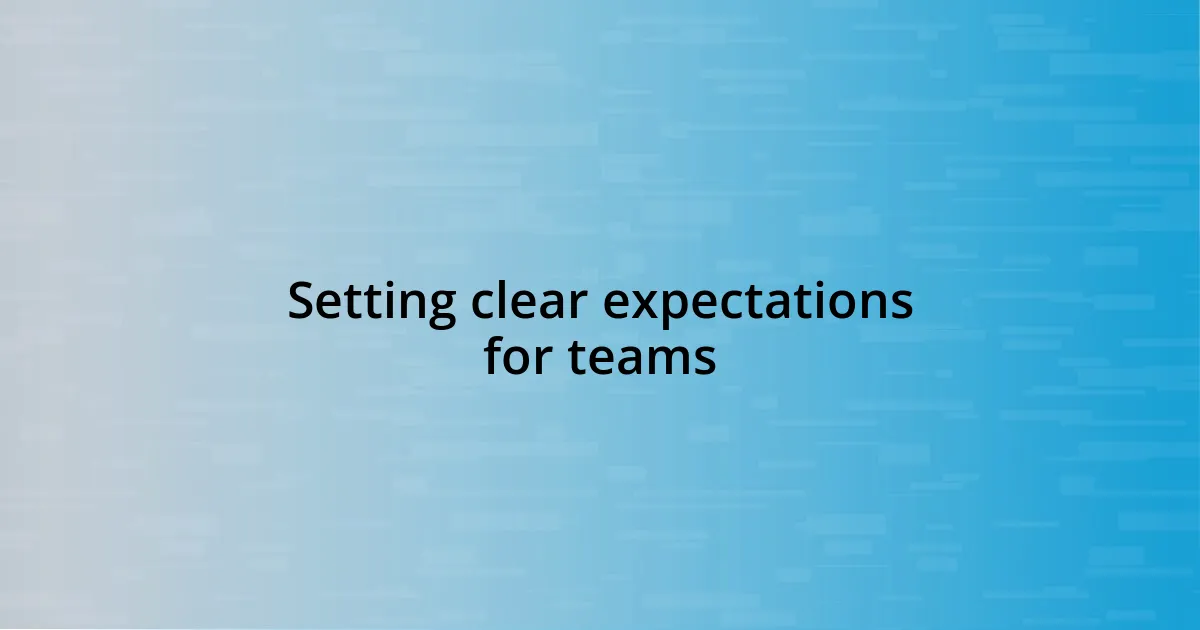
Setting clear expectations for teams
Setting clear expectations is crucial for any team aiming to function effectively. I vividly remember a time when I was leading a project, and we hit a snag because everyone had different interpretations of what needed to be done. It made me realize that without clear guidelines, even the most talented teams can flounder. Setting specifics from the start allows everyone to align their efforts, which fosters a sense of shared purpose.
In my experience, clearly defined expectations can dramatically improve productivity. During one project, I implemented a simple template outlining each person’s responsibilities and deadlines. The shift was immediate. It was as if a cloud had lifted, and my teammates felt empowered to own their tasks confidently. Have you tried this approach? I encourage you to give it a go; it’s amazing how clarity can transform chaos into coordinated action.
Ultimately, clear expectations not only assist in task completion but also enhance team morale. When everyone knows what’s expected, there’s less room for confusion and frustration. I once noticed that when a team has transparency about their roles and goals, it sparks camaraderie. It’s a rewarding feeling when members support one another because they understand their respective contributions to the team mission.
| Aspect | Impact |
|---|---|
| Clarity | Minimizes misunderstandings |
| Responsibility | Encourages ownership of tasks |
| Alignment | Fosters teamwork and collaboration |
| Engagement | Boosts motivation among team members |
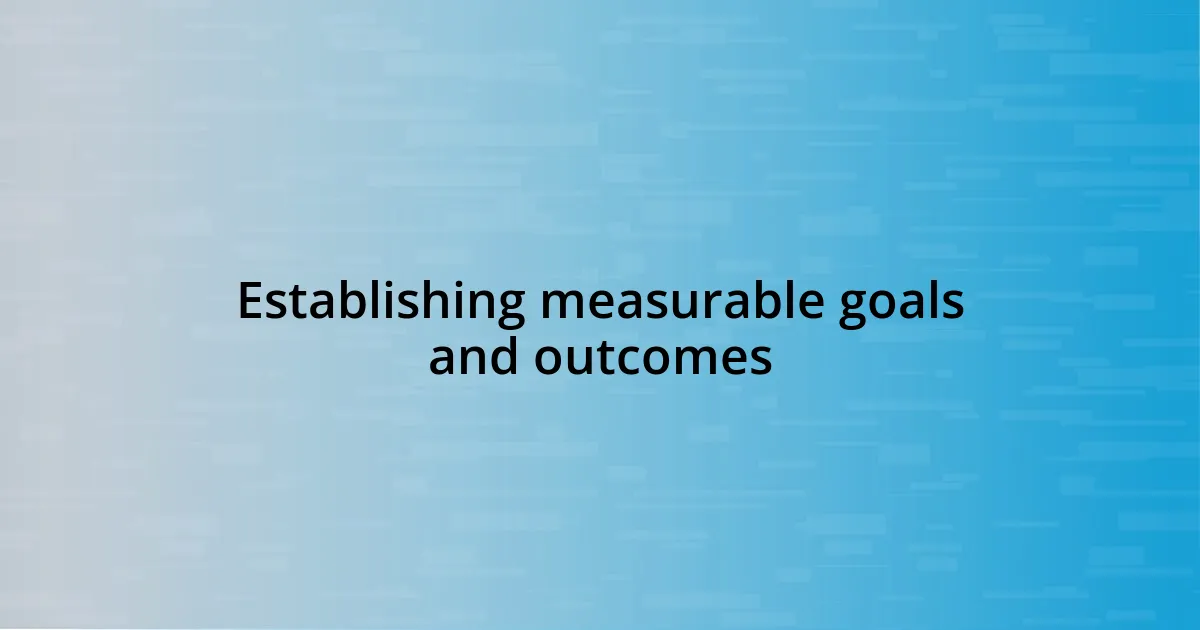
Establishing measurable goals and outcomes
Establishing measurable goals is foundational to team accountability. I remember a project where we set SMART goals—Specific, Measurable, Achievable, Relevant, and Time-bound. This structure was pivotal; it wasn’t just about putting targets on paper, but creating a shared vision. When everyone has clear, quantifiable objectives, it’s easier to track progress and ensure everyone is on the same page. Doesn’t that make sense?
While working on a marketing campaign, I discovered that setting KPIs (Key Performance Indicators) transformed our approach. Each week, we reviewed our metrics, which was not only motivating but it created a sense of urgency. Watching numbers climb or dip sparked conversations that drove our strategies forward. Isn’t it fascinating how data can shape discussions and lead to better outcomes?
Moreover, measuring success means celebrating milestones together. During another project, every time a goal was achieved, we took a moment to recognize the effort. It reinforced our commitment and built a culture of appreciation. Have you ever noticed how recognizing small wins can boost morale? Establishing measurable goals isn’t just about accountability; it’s about fostering a team spirit that propels everyone forward.
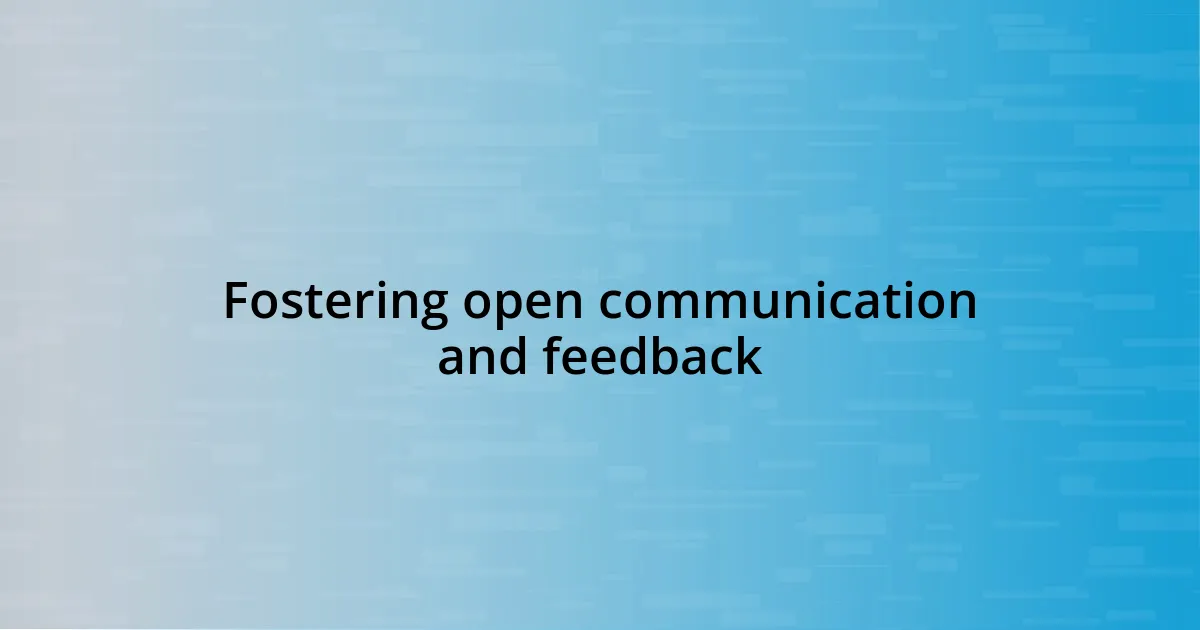
Fostering open communication and feedback
Fostering open communication starts with creating a space where team members feel safe to express their thoughts. I recall a team meeting where I encouraged everyone to share their ideas, no matter how unconventional they seemed. The atmosphere shifted dramatically; people began to open up, and the team generated innovative solutions that we hadn’t considered before. Have you ever noticed how the best ideas can come from the most unexpected places when everyone feels empowered to speak?
One technique I’ve found effective is regular check-ins—both formal and informal. For instance, I set up weekly huddles where we could discuss challenges and successes openly. These gatherings became a platform for real-time feedback, allowing us to adapt quickly and celebrate small victories together. I’ve often thought about how valuable these moments are; they not only keep everyone informed but also reinforce a culture of continuous improvement. Wouldn’t you agree that consistent dialogue can dramatically enhance team dynamics?
Encouraging constructive feedback is equally vital. I once worked on a team where peer evaluations were part of our process, and at first, it was a bit awkward. However, as we got used to giving and receiving feedback, it transformed our interactions. People started to see it as a tool for growth rather than criticism, which fostered a trusting environment. Reflecting on that experience made me realize how powerful feedback can be when framed positively, encouraging everyone to evolve not just as professionals but also as collaborators. How do you cultivate a feedback-rich culture in your teams?
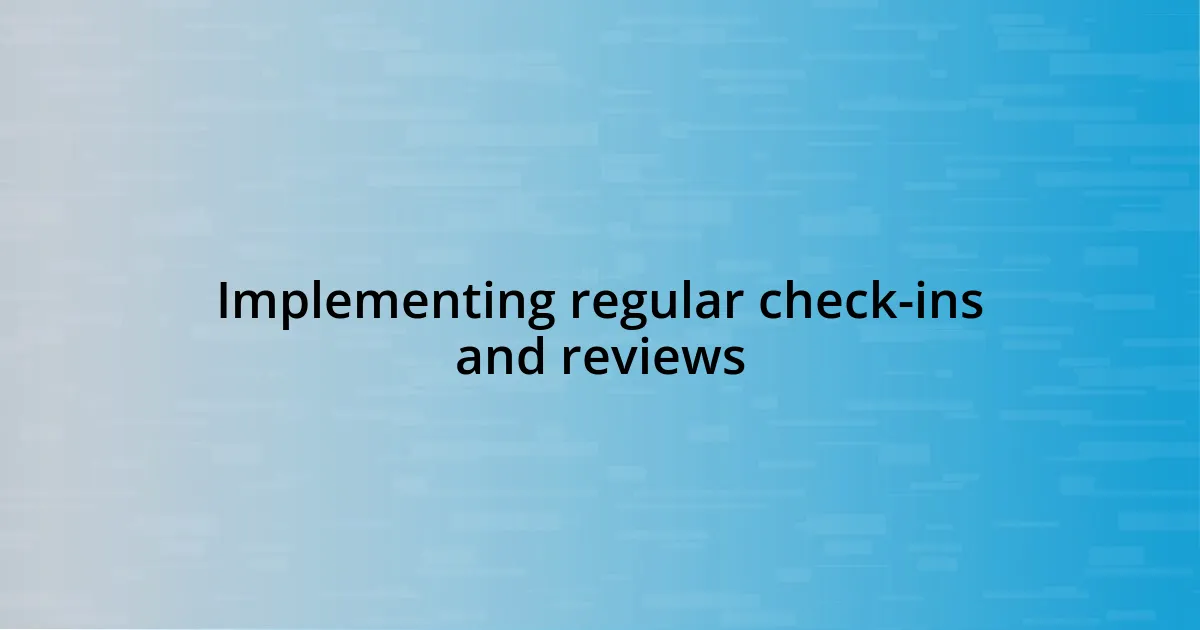
Implementing regular check-ins and reviews
Implementing regular check-ins and reviews is a game-changer for team accountability. I once led a project that felt overwhelming until I introduced bi-weekly check-ins. These sessions transformed our workflow; rather than waiting until the end of the project to assess our progress, we were engaging in meaningful conversations about our challenges and successes along the way. Isn’t it amazing how just a bit of structure can help us stay aligned and focused?
I also recall a time when our reviews became a space for deeper understanding. We used a collaborative platform to gather insights before each meeting, allowing everyone to come prepared with feedback and ideas. The first time we did this, I was astounded by the depth of discussion. Team members who were usually quiet voiced their thoughts, sharing perspectives that led to significant shifts in strategy. Have you ever experienced that moment when a simple process change unlocks a treasure trove of insights?
Consistency in these check-ins cultivated a sense of accountability that pushed us to take ownership of our responsibilities. I remember feeling a buzz of anticipation before each review, as if we were gearing up for a mini celebration of our efforts. It was during these moments that we not only reflected on what worked but also learned from our missteps. Isn’t it comforting to know that even setbacks can pave the way for growth? By embracing regular reviews, I’ve seen firsthand how they instill a sense of purpose and drive progress for everyone involved.











